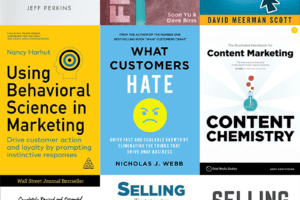Episode 46 of The Verblio Show
Episode Summary
Lola Bakare has held numerous strategic leadership roles in multinational tech companies, including a stint as chief of staff and strategy integration at Dell. Today, she’s the founder of be/co where she partners with ambitious marketing executives to maximize their business impact.
Lola speaks to the value that inclusive marketing can bring to a company’s bottom line, in addition to making a meaningful impact in society. She also discusses a few key metrics to consider and highlights a few examples of brands doing inclusive marketing well — and not so well.
Guest-at-a-Glance
???? Name: Lola Bakare
???? What she does: Inclusive marketing strategist and founder of be/co.
????️ Find Lola on the web: be/co | LinkedIn | Twitter
???? Get smart: “We have to be true to how we function when we look at inclusivity and make it akin to how we function in business overall. Risk is part of the game.”
Top Takeaways
Inclusive marketing should raise your bottom line ????
“Inclusive marketing,” explains Lola, “makes a measurable, meaningful impact to society while also impacting the bottom line for businesses more effectively than anything else.” At a time when the need for better inclusion and equity in our society is urgently apparent, “productizing” social justice can be viewed as opportunistic. Lola views it differently: “In our system of corporations, at the end of the day, maxing profitability is the goal. It’s not going to change.”
Revenue-boosting campaigns are how you achieve buy-in across a team and across a company. When inclusive marketing is done in an authentic way that’s aligned with a brand’s core identity, it lets consumers connect with brands on a more emotional level, which builds brand loyalty and bolsters buying behavior—in addition to contributing to important social conversations.
Follow the RSR framework ????
Whether you’re trying to get buy-in from your colleagues or quantifying a framework for monitoring the success of your inclusive marketing, you need to measure three key performance indicators:
- Revenue impact
- Social impact
- Reputation impact
Lola shares the example of Giant Foods, which announced in December 2020 that all of its grocery stores would start to add labels to its shelves to show customers what products were owned by women, veterans, people of color, or those from the LGBTQ+ community.
In Giant’s case, their RSR framework would indicate:
- How the addition of these labels drove increased consumer spending in specific product categories.
- How Giant’s initiative was supporting brands, farms and workers from marginalized or underrepresented groups.
- How the marketing and earned media coverage was boosting Giant’s reputation and brand loyalty among consumers.
Episode Highlights
Why inclusive marketing works
“I fundamentally believe that we as humans want the best for each other, at our core. So if we make the assumption that that’s a fundamental truth—and yes we have a lot of barriers based on how we’re socialized and based on some of the inherent injustice in our systems—still, that fundamental truth means that if you as a marketer are trying to make an emotional connection—which is what we know leads to purchases, leads to loyalty, leads to customer acquisition—how better to make an emotional connection than demonstrating how your brand is truly making an impact to the world?”
Don’t be afraid to step into this space
“There’s a fear that as business owners, especially those who are white and especially white males, it can be hard to say, ‘I’m going to play in this space.’ But here’s what I would suggest: What’s the alternative? The alternative is doing nothing. The alternative is status quo. So I think it’s really about internally reframing the fear of not getting it right the first time, and engaging and listening and amending your approach, to get to that comfort level for everybody.”
Productizing social justice is a good thing
“We need to reframe thinking about productizing social justice as a negative. Like, we’re gonna profit anyway. [Ben & Jerry’s] were going to have a new flavor anyway. Why not have the new flavor be something that tells a deeper story, because you can?”
Maxing revenue is how we get everyone on board
“In our system of corporations, at the end of the day, maxing profitability is the goal. It’s not going to change. We can’t decide to become charities because in the competitive market, someone else is going to say, ‘Well, I’m not doing that.’
So the only way to truly make people across the board own realizing that social impact is important and not make it just a fringe thing, is to change the way people look at the potential revenue impact of social impact. Then everybody’s bought in, and that’s what we want.”
The real risk? Feeling unliked
“We have to be true to how we function when we look at inclusivity and make it akin to how we function in business overall. Risk is part of the game. And it isn’t even that risky. The real risk is to psychological safety, and people need to face that. The real risk is to, like you said, feeling unliked, frankly, probably by the other white people who don’t want to get involved and are going to be triggered that you are. The people you’re benefiting aren’t going to come after you because you’re benefiting them.”
Lessons from a liberal arts degree: The power of persuasion
“Marketing is an ideal career path for an English major because you spend four years taking a story and being asked to have a stance or an opinion on it that can lead to something else, and you learn how to write to persuade your reader to believe that, too. And as marketers, that’s fundamentally what we do.”
Top Quotes
????️ Lola:
“There’s inspiration everywhere. And as a marketer, sometimes that organic, ‘whatever just happens,’ can lead to what a brand becomes versus it being so intentional.”
“Inclusive marketing in a nutshell is marketing that makes an impact—a measurable, meaningful impact to society—while also impacting the bottom line for businesses more effectively than anything else.”
“How can you maximize the movement? It’s by doing things that allow people to see your commitment to social impact, but that also really draw them in.”
“We need to reframe thinking about productizing social justice as a negative.”
Learn More
Dig into the books Lola mentioned on the show:
- Mediocre: The Dangerous Legacy of White Male America by Ijeoma Oluo
- Conscious Capitalism and Conscious Leadership by John Mackey, founder of Whole Foods
And check out Lola’s Maximize the Movement program.



